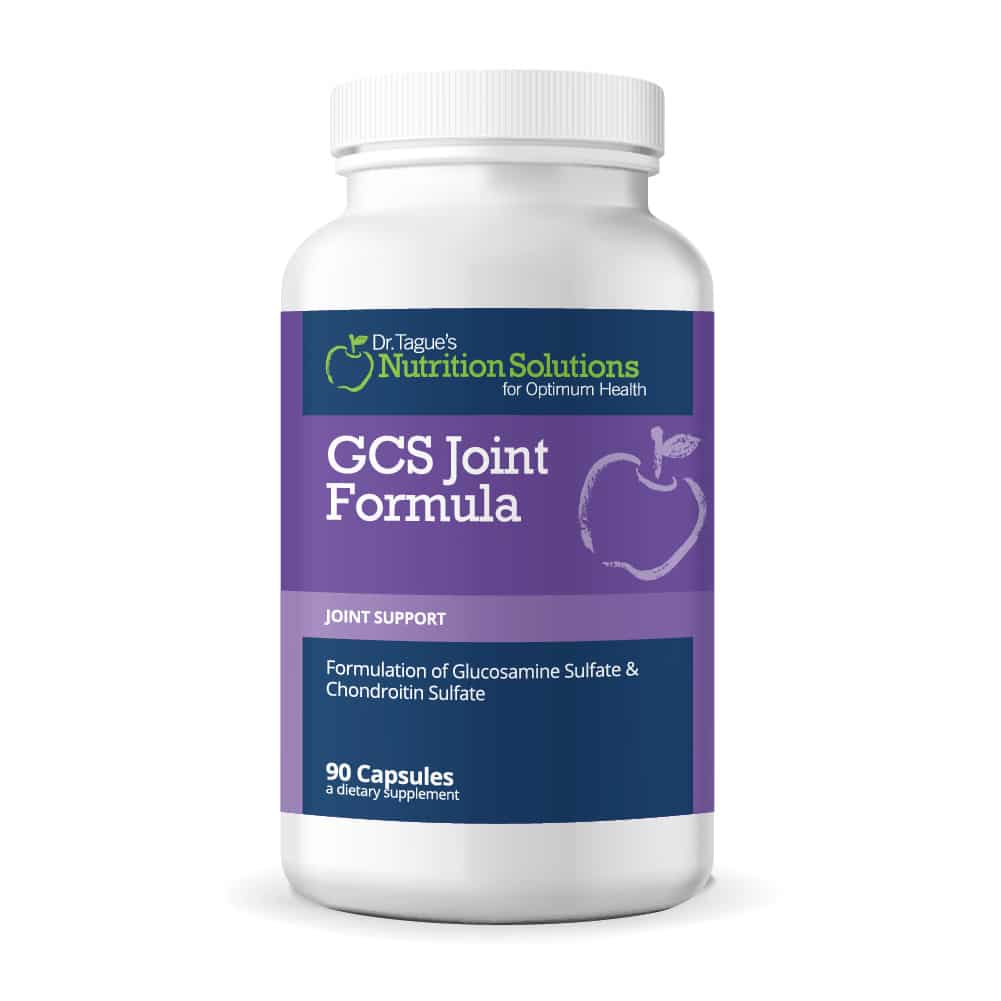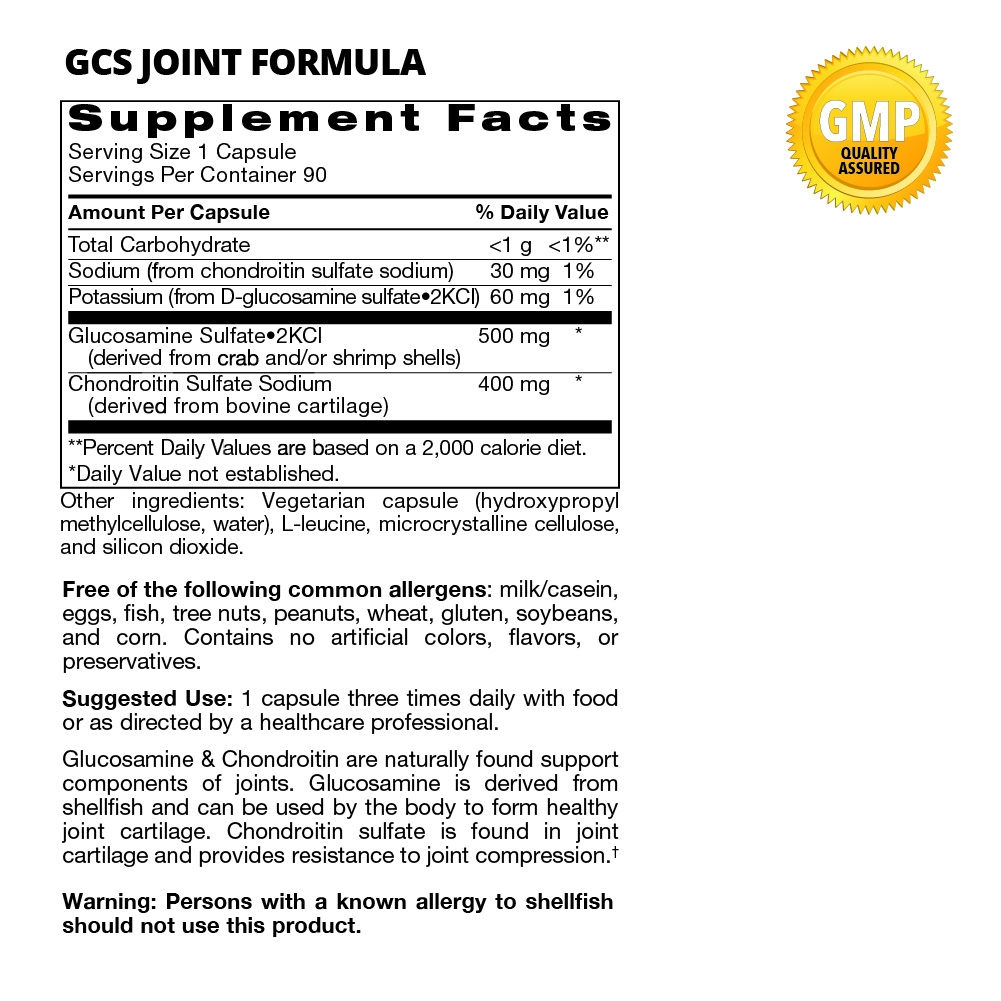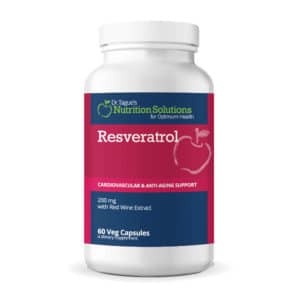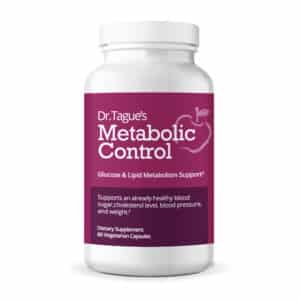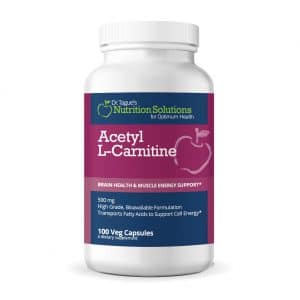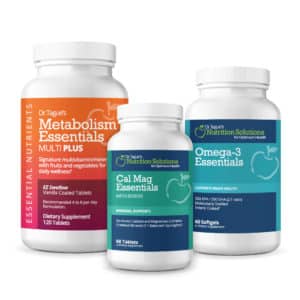GCS Joint Formula
Glucosamine & Chondroitin Sulfate
Glucosamine and chrondroitin are popular for joint injury or joint pain relief. Glucosamine, which naturally occurs in the body, plays a key role in the construction of cartilage, the tough connective tissue that cushions the joints. Cartilage is slowly lost in our joints with age and/or injury. Scientists speculate that the decrease in cartilage results, at least partially, from the body not making or absorbing enough glucosamine. Because cartilage work as a lubricant, this loss causes friction and pain.
Evidence from many well-designed trials indicates that glucosamine may be an effective treatment for osteoarthritis. In general, findings from these studies suggest that glucosamine provides several benefits for people with osteoarthritis including pain reduction, improved function and mobility, and slowed progress or even prevention of joint destruction. A large-scale study sponsored by the National Institute of Health involving over 1500 patients showed that 79% of the patients with moderate to several pain had significantly decreased knee pain when taking the glucosamine chondroitin combination. Patients experiencing mild knee pain were not affected.
Glucosamine Compared to NSAID Treatment
While medication is not available to cure osteoarthritis, nonsteroidal anti-inflammatory drugs (NSAIDs), such as arthritis drugs, ibuprofen, and aspirin are used to treat the pain. NSAIDs have traditionally been used for symptoms of osteoarthritis, but are now known to increase the risk of heart attack and stroke. Supplements are preferred by many due to their lack of side effects. One study showed fewer joint surgeries (50% fewer), slower disease progression, and better quality of life after 3-5 years of using glucosamine.
NSAlDs work to reduce inflammation by blocking enzymes that produce hormone-like substances called prostaglandins. Prostaglandins promote inflammation, pain, and fever, but also support blood-clotting functions and protect the stomach lining from the damaging effects of acid. When prostaglandins are reduced in the body with treatment of NSAIDs, pain and inflammation are reduced, but other body systems are also negatively affected.
NSAIDs can cause stomach upset, cramps, diarrhea, stomach ulcers, and bleeding. More serious effects include kidney damage and heart attack. Dr. James Fries, at Stanford University of Medicine estimated 76,000 Americans are hospitalized annually for intestinal bleeding due to NSAIDs. The New England journal of Medicine reported 30% of NSAID users develop stomach ulcers. So although NSAIDs cause a quicker response to pain than glucosamine, scientists have begun to question the long-term use of NSAIDS for osteoarthritis because of their serious and common side effects.
Why Chondroitin with Glucosamine?
Glucosamine is often taken with chondroitin, another supplement thought to be effective in treating osteoarthritis. Chondroitin is another major component of cartilage. One small MRI study showed a slowing of joint damage within 6 months of taking chondroitin. Like glucosamine, chondroitin sulfate stimulates the production of cartilage and works to maintain flexibility in the joints. Likewise, it works to prevent enzymes from dissolving cartilage. Glucosamine alone or in combination with chondroitin sulfate is becoming more recognized as a treatment for osteoarthritis.
Dosage Recommendations
Suggested Usage: 1 capsule three times daily with food or as directed by a healthcare professional.
Precautions & Safety
Glucosamine & Chondroitin are naturally found support components of joints. Glucosamine is derived from shellfish and can be used by the body to form healthy joint cartilage. Chondroitin sulfate is found in joint cartilage and provides resistance to joint compression.
Glucosamine may increase the anti-inflammatory activity of NSAIDs such as ibuprofen. This interaction may result in the need for lower doses of these medications. Those considering glucosamine should consult with their doctor before making any changes to their current medications.
Persons with a known allergy to shellfish should not use this product.
Note to Men: Chondroitin is not recommended with a history of prostate cancer or in those at high risk of prostate cancer, such as having a brother or father with prostate cancer. We recommend you do not take this supplement if you are at high risk of prostate cancer.
Keep out of reach of children.
